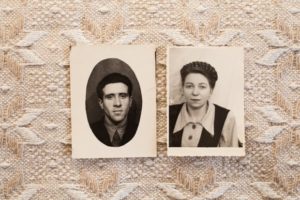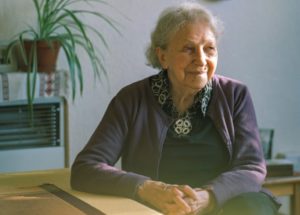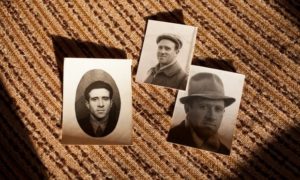Continua la collaborazione tra il liceo linguistico "Cattaneo dall'Aglio" e Redacon tramite la rubrica "Speakeasy" curata direttamente dagli studenti, dell'anno scolastico 2019-2020.
“A 60 year long love, despite the gulag.”
A strong friendship doesn’t need daily conversation or being together. As long as the relationship lives in the heart, true friends never part. Kasia Delgado, on The Guardian, gives us a moving account of friendship, love and suffering.

18 April 1959
“Who knows? We might meet one day. We must believe this, otherwise there is no point to living. You are always in my heart.”
Ivanna Maszczak, now 93, born in Ukraine, was taken from her family one frosty January morning in 1948 while her mother, a school teacher, was making beetroot soup for lunch. She belonged to an Ukrainian youth organisation. At that time every Ukrainian was under suspicion. Her father was a priest, which didn’t help, because the authorities were suspicious of priests, members of the intelligentsia, teachers and students. Even after Nazi Germany’s surrender in May 1945, the civil war in Ukraine and eastern Poland continued, as underground organisations, including the Ukrainian Insurrectionary army, refused to live under communist rule. Ivanna was one of many thousands of ethnic Ukrainians sent to a gulag in Siberia, after being accused of aiding the rebellion. Military guards stormed the house and marched the 22-year-old out of her home and into a truck.
It has now been 64 years since Ivanna was released, but eight years in the gulag still has an impact on her daily life in ways that few outsiders would notice. She doesn’t eat much, it doesn’t occur to her to want anything that she doesn’t have, she sleeps on a futon in the living room as she hates feeling confined in a small bedroom and she doesn’t like doors being closed because it reminds her of being imprisoned. She even leaves the wardrobe doors opened.
That’s because she served a 10-year sentence in the Siberian Stalin’s labour camp in Kolyma. She was 28 years old, 5ft tall, and hungry. Ivanna and some fellow female prisoners had to work hard all day, every day: mining gold, felling trees and hacking into the frozen ground.
When Ivanna arrived, with many other prisoners, they were in their tatty, thin clothes and, getting off the boat, they were so weak that some of them fell into the snow. Everyone got the same size clothes and shoes and typhoid injections.
Numbers were sewn on to their backs (she was 108). They felt their identity was taken away from them.
One day something suddenly happened ...
As they stumbled through the snow, a scrunched-up piece of paper landed at their feet, thrown from a truck transporting male prisoners. One of them picked it up before a guard noticed, and later the women huddled together and opened it. It was from a male prisoner asking whether someone would write to him, to distract him from the relentless bleakness. Ivanna was deeply moved and she decided to reply to this stranger.
His name was Vladimir; he was the same age as Ivanna. She asked around, found out which part of the gulag he was in and managed to get a letter to him. She used the pen and paper the prisoners were sometimes given in order to write home. Their letters, which Ivanna has kept, stored in a wooden box, came back and forth, talking of life in the camp.
It was illegal for prisoners to correspond with each other, so they relied on the construction workers to deliver the letters. Sometimes it took weeks for a letter
to come, and some letters disappeared. Vladimir wanted to find a kindred spirit and Ivanna became that person. Despite the fact that they were unable to meet, she began to feel a deep bond with this young man. After the cruelty she had seen, writing to him was some respite from the hell she was in. She was terribly lonely, so to have Vladimir wanting to know how she felt made things bearable. At first it was friendship, but when someone talks for so long, so intensely, they start to feel love. In one letter Vladimir writes to Ivanna that waiting for her letters caused his heart to beat faster. In another, he told her to believe that his love was so great that he would do anything for her. They made tentative plans to meet if they were ever freed.
Ivanna was finally released in August 1955, after almost eight years of her sentence. Ivanna’s family had no idea she was coming home. When she arrived home she didn’t even know how to cry and she didn’t know how to live as a free person. Buying milk, going to a hairdresser, eating an apple. Her freedom came too late for her to be reunited with her father; he had died just two months before her return home.
Vladimir was still imprisoned, and when she first wrote to him from the outside world, he replied that if he had had the opportunity, he would have left everything behind and followed her. Vladimir was released two years later. They continued to write each other.
But one day, Vladimir wrote again to tell Ivanna he was getting married. Under pressure from his father. She felt that, despite his marriage, they had an unbreakable bond: the bond of two people who had been in prison together for so long. She understood how things were, that he needed to move on. Despite this, the letters kept coming and Vladimir confided in her, telling her he found it difficult to adjust to normal life.
A few years later, Ivanna got married, too. While visiting a friend in Britain, she was introduced to a Ukrainian man named Wolodomyr who proposed to her just five days after they met. She never regretted it. They lived a simple life in London, and were happy together for 47 years. Wolodomyr understood why the correspondence with Vladimir was still so important to his wife. In fact Ivanna and Vladimir continued to share their thoughts, hopes, doubts, expectations and love. Then one morning Ivanna received a curt letter from Vladimir’s wife demanding that the correspondence cease immediately. Ivanna never heard from Vladimir again. It hurt her greatly. She didn’t write back to Vladimir. She
didn’t want to interfere in his family life. She knew she had been lucky to be released from Siberia early, but she had lost out on a chance to meet him.
Three years ago, contemplating her old age, Ivanna wondered whether this might be a good time to re-establish contact. She googled Vladimir and found he had his own website. She immediately recognised him thanks to the photos. Yet after more research she discovered that it was too late, and he had recently died. She regretted not having looked for him before, even though she did it for him, to save his marriage.

It’s been more than 50 years since Ivanna received her final letter from Vladimir. Now in her 90s, she thinks more than ever about the bond they forged in the gulag. They were linked by their experience. Those letters were a lifeline, they gave her some purpose.
In a letter to Ivanna while he was still imprisoned, Vladimir wrote: “Life is very short and we only live once, but, wherever I am and whatever happens to me, I will remember and think of you always.”
(Beatrice Ganapini e Giacomo Galluccio 5Q, Liceo Linguistico Dall’Aglio)
***
“Un amore durato 60 anni, nonostante il gulag.”
Un’amicizia forte non ha bisogno di una perenne conversazione o dello stare sempre insieme. Finché il rapporto vive nel cuore, i veri amici non se ne vanno mai. Kasia Delgado, su “the Guardian”, ci da un commovente resoconto di amicizia, amore e sofferenza.
18 Aprile 1959
“Chi sa ? Potremmo incontrarci un giorno.
Dobbiamo crederci, altrimenti non ci sarebbe ragione di vivere. Sei sempre nel mio cuore.”
Ivanna Maszczak, ora novantatreenne, nata in Ucraina, fu strappata alla propria famiglia un gelido mattino del Gennaio 1948 mentre sua madre, una maestra elementare, cucinava una zuppa di barbabietola per pranzo. Apparteneva ad un’organizzazione giovanile ucraina. All’epoca ogni ucraino era sospettato. Suo padre era un sacerdote, il che non aiutava, perché le autorità erano diffidenti nei confronti di sacerdoti, membri dell’intellighenzia, maestri e studenti. Anche dopo la resa della Germania nazista nel maggio 1945, la guerra civile in ucraina e in Polonia orientale continuò, siccome le organizzazioni sotterranee, inclusa l’armata insurrezionale ucraina, rifiutò di vivere sotto il governo comunista.
Ivanna era una delle tante migliaia di ucraini mandati in un gulag in Siberia, dopo essere stati accusati di favorire la ribellione. Le guardie militari presero d’assalto la casa e portarono la ventiduenne fuori dalla propria casa caricandola in un camion.
Sono passati 64 anni da quando Ivanna fu rilasciata, ma otto anni nel gulag hanno ancora un impatto nella sua quotidianità, in modi che chi non conosce la sua storia non potrebbe notare. Non mangia tanto, non le viene in mente di aver bisogno di qualcosa che non ha, dorme su un futon in salotto, siccome odia sentirsi costretta in una piccola camera da letto e non le piacciono le porte chiuse, perchè la fanno sentire imprigionata. Lascia aperte persino le porte del guardaroba.
Il motivo di tutto questo è che ha lavorato per 10 anni nel campo di lavoro a Kolyma. Aveva 28 anni, era alta un metro e 52 e affamata. Ivanna e le sue compagne dovevano lavorare duramente tutto il giorno, ogni giorno: estraendo oro, abbattendo alberi e scavando nel terreno ghiacciato.
Quando Ivanna arrivò con molti altri prigionieri, indossavano i loro abiti trasandati e sottili e scendendo dalla barca, alcuni di loro erano così deboli che caddero sulla neve. Tutti ricevevano la stessa taglia di abiti, scarpe e un’iniezione contro il tifo.
I numeri erano cuciti sulla loro schiena (lei era la numero 108). Sentirono come se la loro identità venisse portata via.
Un giorno qualcosa successe improvvisamente …
Mentre barcollavano sulla neve, un pezzo di carta accartocciato cadde davanti ai loro piedi, lanciato da un camion che trasportava prigionieri maschi. Una di loro lo raccolse prima che una guardia potesse accorgersene e in seguito le donne si riunirono insieme e lo aprirono. Apparteneva ad un prigioniero che chiedeva se ci fosse qualcuno disposto a scrivergli, per distrarlo dall’implacabile desolazione. Ivanna fu profondamente commossa e decise di rispondere a questo sconosciuto.

Il suo nome era Vladimir; aveva la stessa età di Ivanna. Lei chiese in giro e scoprì da quale parte del gulag venisse e riuscì a fargli arrivare una lettera. Utilizzò la carta e la penna che venivano date ai prigionieri ogni tanto per scrivere a casa. Le loro lettere, che Ivanna ha custodito in una scatola di legno, facevano avanti e indietro, parlando della vita nel campo.
Era illegale per i prigionieri comunicare tra loro, perciò si affidarono ai muratori per spedire le lettere. Qualche volta ci voleva una settimana perché la lettera arrivasse e a volte alcune lettere sparivano. Vladimir voleva trovare l’anima gemella e Ivanna diventò quella persona. Nonostante il fatto che non si potevano incontrare, lei cominciò a sentire un profondo legame con quest’uomo. Dopo la tutta crudeltà che aveva visto, scrivergli era una sorta di tregua dall’inferno in cui si trovava. Si sentiva terribilmente sola, perciò avere Vladimir che voleva sapere come si sentiva, aveva reso le cose più sopportabili. All’inizio si trattava di un’amicizia, ma quando qualcuno parla per così tanto tempo, così intensamente, comincia ad innamorarsi. In una lettera Vladimir scrisse ad Ivanna che aspettare le sue lettere faceva battere il suo cuore più forte. In un’altra, le disse che di credere che il suo amore era così grande, che avrebbe fatto qualsiasi cosa per lei. Avevano pianificato di vedersi in caso fossero stati liberati.
Ivanna fu finalmente liberata nell’agosto 1955, dopo aver scontato circa otto anni della sua sentenza. La famiglia di Ivanna non aveva idea che stesse tornando a casa. Quando arrivò a casa non sapeva nemmeno come piangere e come vivere come una persona libera. Comprare il latte, andare dal parrucchiere, mangiare una mela. Fu liberata troppo tardi per riunirsi con suo padre, che era morto appena due mesi prima che lei tornasse a casa. Vladimir era ancora imprigionato e quando lei gli scrisse per la prima volta dal mondo esterno, lui rispose che se ne avesse avuto la possibilità, si sarebbe lasciato tutto alle spalle per seguirla. Vladimir fu rilasciato due anni dopo. I due continuarono a scriversi.
Ma un giorno, Vladimir scrisse ancora per dire a Ivanna che si stava per sposare. Sotto pressione di suo padre. Lei continuò a sentire, nonostante il matrimonio, che avevano un legame indistruttibile: il legame di due persone che erano state in prigione insieme per tantissimo tempo. Capì come stavano le cose, che lui aveva bisogno di andare avanti. Nonostante questo, le lettere continuavano ad arrivare e Vladimir si confidò con lei, dicendole che trovava difficile adattarsi alla vita normale.
Pochi anni dopo, anche Ivanna si sposò.
Durante una visita ad un amico in Inghilterra, le venne presentato un uomo ucraino di nome Wolodomyr che le chiese di sposarlo solamente dopo cinque giorni di conoscenza. Non si pentì mai di averlo sposato. Vissero una vita semplice a Londra, felici insieme per 47 anni. Wolodomyr capì il motivo per il quale la corrispondenza con Vladimir era ancora così importante. Infatti Ivanna e Vladimir continuarono a condividere pensieri, speranze, aspettative e amore. Poi un giorno, Ivanna ricevette una dura lettera dalla moglie di Vladimir che le chiese di cessare la corrispondenza immediatamente.
Ivanna non seppe più niente di Vladimir. Questo la ferì molto. Non scrisse mai più a Vladimir. Non volle interferire nella sua vita familiare. Ivanna sapeva di essere stata fortunata ad essere rilasciata prima dalla Siberia, ma aveva così perso l’occasione di incontrarlo.
Tre anni fa, pensando alla sua vecchia età, Ivanna si chiese se fosse un buon momento per ristabilire un contatto con Vladimir.
Cercò su Google Vladimir e scoprì che aveva un proprio sito web. Lo riconobbe immediatamente grazie alle foto. Ma dopo un po’ di ricerca scoprì che era troppo tardi, perché era morto da poco. Lei si pentì di non averlo cercato prima, anche se lo fece per lui, per salvare il suo matrimonio.

Sono passati più di cinquant’anni da quando Ivanna ha ricevuto la sua ultima lettera da Vladimir. Ora più che mai, con i suoi novant’anni, Ivanna pensa al legame che i due avevano stabilito nel gulag. Loro erano collegati dalla loro esperienza. Quelle lettere erano un’ancora di salvezza e hanno dato a loro uno scopo.
Vladimir, in una lettera per Ivanna di quando si trovava ancora nel gulag, scrisse: “la vita è molto corta e viviamo solo una volta, ma, dovunque io sia e qualsiasi cosa mi succeda, mi ricorderò e penserò sempre a te”.
(Beatrice Ganapini e Giacomo Galluccio 5Q, Liceo Linguistico Dall’Aglio)







